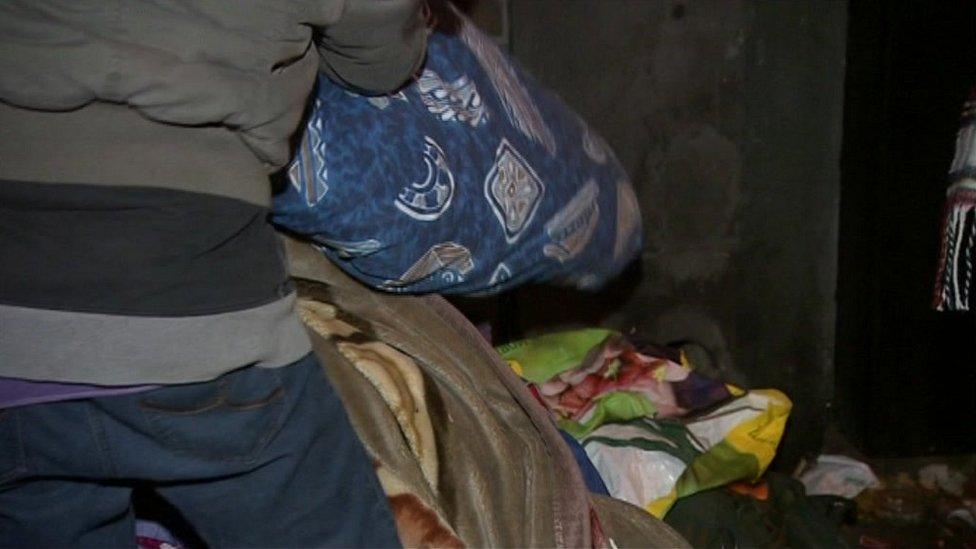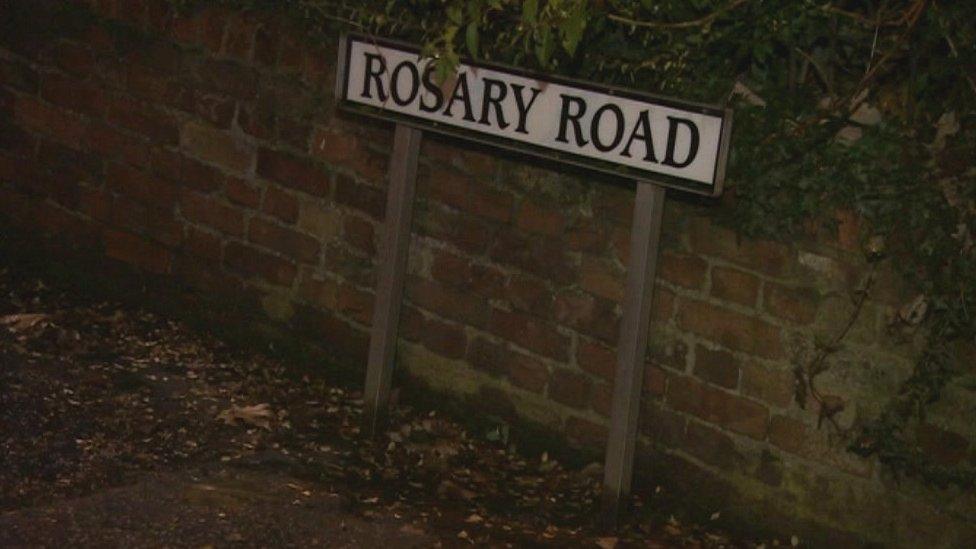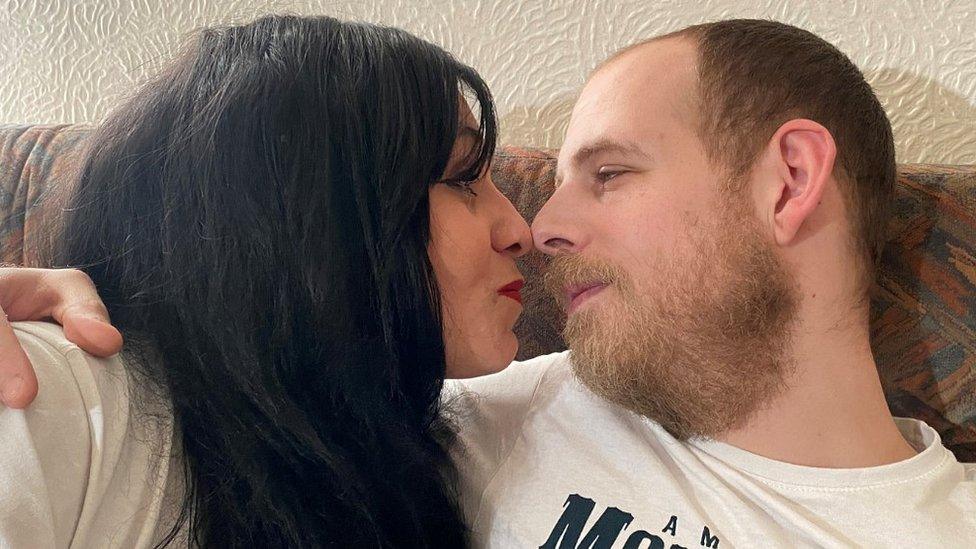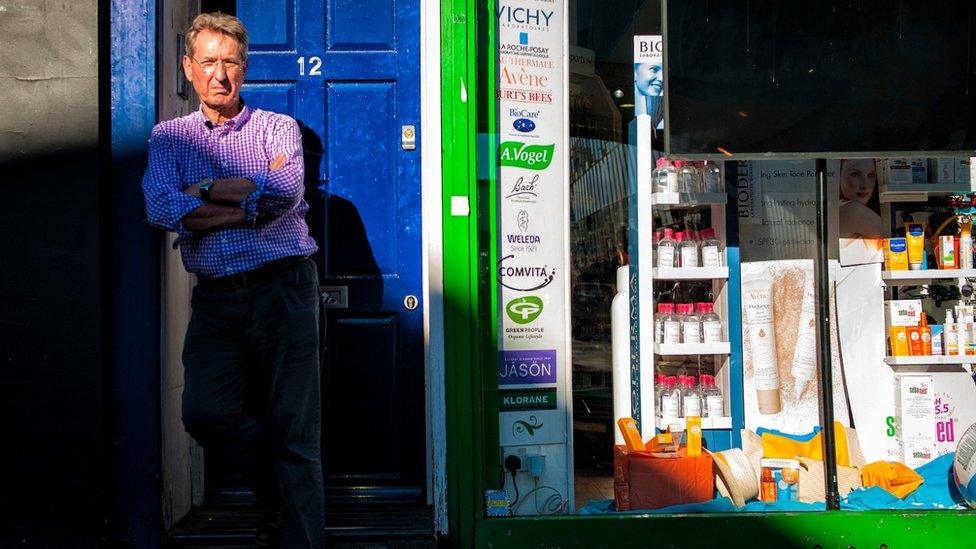From homeless on the streets of Norwich to motherhood
- Published
Now a mother, Jessy is enjoying her new life living in a flat with her fiance
Five years ago Jessy was homeless and working as a prostitute to feed her heroin habit. Now clean of drugs, she has a home to call her own, a loving partner and a baby girl. How did she turn her situation around?
"An addict's life is just to make money to score, make money to score, make money to score," as 19-year-old Jessy once told the BBC. "Maybe eat, then make money to score. Go to bed. Wake up and then start the whole cycle again."
Still addicted to heroin at the time, and living rough on the streets of Norwich, she was candid about her addiction.
"I only take heroin to get up and feel well like a normal person," she said. "Just to be able to get up and to walk around and not feel ill and like crap.
"It becomes your air, you need it to live.
"It dominates everything."
Not any more.

Jessy was sleeping rough in Norwich for three years
Today, Jessy lives away from Norwich with her partner, Corey, and her young daughter.
She shakes her head on seeing the footage she made with the BBC from her life five years ago.
"It just shows how much that had hold of me. I think I felt a lot of shame, I guess. I still do."
To fund her drug habit she turned to sex work.

Jessy was once banned from the red light area of Rosary Road in Norwich while operating as a sex worker
Explaining at the time how she became a prostitute, she said: "It was the middle of winter and I found myself, when my boyfriend was in prison, on my arse really with nowhere to go, it was freezing cold and a habit to feed.
"One of my friends was a working girl and we got stopped and she got offered business and so did I and I took it.
"I sat there thinking how happy I would be with the money afterwards.
"You've just always got to focus on the money and remember what you are doing it for. It is just a job."
You might also be interested in:
She was acutely aware of the risks.
"Anything could happen," she said at the time. "Look at the Suffolk strangler Steve Wright.
"There could easily be another Steve Wright out there who picks me up next time.
"I know that, but it is a risk you've got to take."
The scale of theproblem in the UK
140,863Adults were in treatment for optiate use in 2020-21.
22,493Of those in treatment for addiction also had a housing problem.
50%Of those who left treatment last year completed it successfully, free of dependence.
Eventually, Jessy reached rock bottom and found herself imprisoned for drugs offences.
In hindsight, she believes prison was her saviour.
"From being in prison I got a break, I suppose, from the lifestyle," she said. "Then not long after that I met my partner Corey and we just decided that Norwich was the big problem.
"We packed up all of our belongings and we left."
Once established in her new home she took advantage of the addiction support on offer.
"I said I'd do whatever you tell me to do to get myself healthy.
"I stopped using and voluntarily went every week for drug tests, and I am proof that if you try, and are really dedicated, then you can achieve anything."
Having a home to call her own means the world to Jessy.
"The first night I spent here was just amazing," she said. "Having a door that I could lock and this being my space, secure, there's nothing like it, that feeling of having your own space."

Jessy and Corey have recently become engaged to marry
When the BBC first met Jessy, the teenager was suffering with collapsed veins from regularly injecting needles into her arms.
Today, the 24-year-old Jessy's veins have largely recovered.
"You just have to leave them alone," she said. "They do rejuvenate.
"I haven't escaped unscathed.
"I've got a few missing teeth, I've got scars but I know people who have lost their limbs, lost their lives.
"People think it is impossible. It is not something I could ever teach somebody how to do."
Michael Rawlinson, a treatment consultant who works with the Forward Trust at Clouds House in Salisbury, said: "The courage it takes people to ask for help is huge.
"There is a lot of stigma around this and at the moment people don't always get the help they need. Recovery and the journey to recovery will look different for everyone.
"Like any serious mental health condition, this is not always a linear process.
"For example, relapse can be part of the journey and should not be seen as a failure. It is not."
Mr Rawlinson said addiction could happen to anyone.
"Success will look different for everyone," he said. "As a society we need to lower barriers to treatment entry and accessibility.
"People need to be able to ask for help and receive support, without judgement or stigma."

Therapist and addiction specialist Chip Somers praised Jessy for leaving her previous lifestyle behind her
Therapist and addiction specialist Chip Somers said: "Being able to come away from a lifestyle like Jessy's is hard - it is very uncommon.
"It often takes something outside of the person to make them realise there's something worth living for."
Mr Somers, himself a former addict, added: "Those at the margins of society often end up feeling like they are of no use and of no value - I felt I had no value to anybody. And that makes the idea of investing time and energy in yourself and to get better very difficult.
"It was my daughter who was the trigger for my recovery and I would say for the first year I was doing it for her rather than myself."
Jessy's experience has been similar, she said.
"For me I think I had something for the first time that I wanted more," she said.
That "more" has come to mean the family she has created for herself.
"The future looks pretty bright.
"We recently got engaged, it is my daughter's birthday soon and my family relationships are better and that is something I never thought would happen.
"I didn't think that I could be here now, and it happened, you know the world really is your oyster.
"But you can't half-arse it.
"You have to give it your all. But it is never too late."

Find BBC News: East of England on Facebook, external, Instagram, external and Twitter, external. If you have a story suggestion email eastofenglandnews@bbc.co.uk, external
- Published15 December 2016
